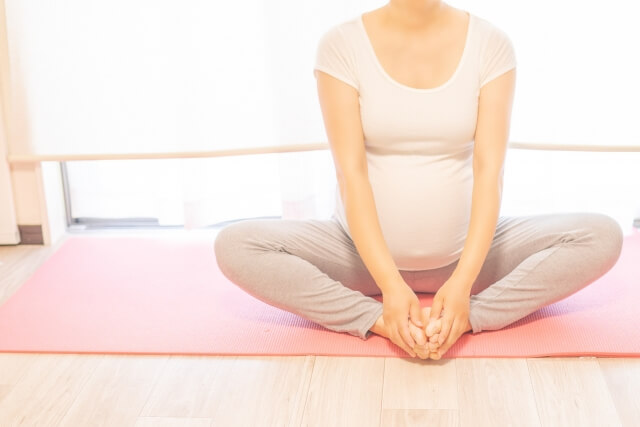Summary of this article
This article introduces pregnant women suffering from cold to what warming up is, the effects of cold on the body, causes of cold, benefits of warming up and methods of warming up. Check out the role of warming up and how to do it, and take care of your health in preparation for childbirth.
Cold is said to be a major enemy of pregnant women. This article introduces what warming up is, the effects of coldness on the body, causes of coldness, benefits of warming up and methods of warming up for pregnant women suffering from coldness. Check out the role and methods of warming up and take care of your health in preparation for childbirth.
What is warming up for pregnant women?
Thermogenic activity refers to activities and habits that warm the body from both inside and outside to raise basal body temperature to the correct level. Originally, the ideal human body temperature should be maintained at 36.5-37.0°C. However, today we see many people whose basal body temperature does not reach 36°C. A low basal body temperature may cause various physical problems. Examples include coldness, swelling and low basal metabolism.
Warming up for pregnant women is not only to raise the body’s overall temperature, but also to improve blood flow to the uterus. As the uterus cannot be directly warmed, it is necessary to improve blood flow so that nutrients and hormones can be fully delivered to the uterus.
Cold is a pregnant woman’s worst enemy
Some pregnant women may suffer from coldness. Cold is a major enemy of pregnant women as it causes various physical problems. Here are four negative effects of cold on pregnant women.
Affects the thickness of the endometrium
The inside of the uterus is covered by a thin membrane called the endometrium. The endometrium plays an important role as a bed for the fertilised egg, but it is important to note that there is a risk of the endometrium not being thick enough due to cold. Changes in the thickness of the endometrium are influenced by hormones carried in the bloodstream.
If the cold is severe, blood flow is blocked and not enough hormones are delivered to the uterus. Low hormone levels make the endometrium thinner, making it more difficult for a fertilised egg to implant.
Affects ovarian function
When the body is cold, ovarian function is more likely to deteriorate. If ovarian function is impaired, female hormones may become unbalanced, causing irregular periods and heavy menstrual pain. In some cases, this can lead to symptoms such as uterine fibroids and ovulation disorders. These symptoms can make it difficult to conceive, so care must be taken.
Reduced blood circulation and metabolism
A common symptom of cold is a deterioration of blood circulation and metabolism. If blood circulation is poor, pregnant women may not receive enough folic acid, iron and zinc through food or supplements, which are necessary for pregnant women. In addition, if blood circulation is poor, the body temperature tends to drop and metabolism may deteriorate as a result.
A slowed metabolism makes it difficult for fat to be burnt, leading to obesity. Obesity risks disturbing the female rhythm and may also have a negative impact on fertility.
Reduced immunity
Cold can cause a drop in basal body temperature. The human body’s immunity is said to drop by as much as 30% when the normal temperature falls by 1°C. Therefore, if the immune system is weakened during pregnancy, resistance to viruses and colds will weaken and there will be a risk of persistent high fevers.
Continued high fever can also increase the risk of miscarriage or premature delivery, and there is concern about the effect on the baby. It is essential to improve the immune system by warming up the body to prevent infection with colds and viruses.
Causes of coldness in pregnant women
The body is said to be more prone to cooling down during pregnancy. Women tend to be colder than men because they have less muscle mass and more fat than men. Here are five causes of coldness.
Reduced heat-producing capacity due to muscle weakness
Muscles are responsible for heat production. Most people experience the body shivering when it is cold or feels chilly. This is caused by muscles shivering to produce heat. However, if muscle strength declines, the ability to produce heat through shivering is also weakened. This can result in coldness.
Decrease in basal metabolism
Basal metabolism is the minimum amount of energy required for a person to maintain vital activities while awake. For example, body temperature regulation, respiration and heartbeat are also carried out by basal metabolism, which accounts for approximately 60% of daily energy consumption.
If the basal metabolism declines, the nutrients ingested are less likely to be utilised as energy, and there is a risk that blood vessels, internal organs and muscles will deteriorate. In addition, the body is more likely to become cold as a result of the decline in the body.
Low blood pressure and anaemia
People with low blood pressure or anaemia have difficulty in getting sufficient amounts of blood throughout the body. This condition also makes it difficult for the organs and cells carried by the blood to receive the oxygen and nutrients they need to work.
This may lead to a tendency to develop coldness. A deficiency of iron also reduces the production of haemoglobin in red blood cells, which makes it harder to carry oxygen in the blood, a characteristic that can lead to coldness.
Autonomic nervous system disturbance
The workings of the internal organs, metabolism and the maintenance of body temperature are controlled by the autonomic nervous system. Therefore, if the autonomic nervous system is disturbed, the regulation of body temperature may not function properly, which may lead to sensitivity to cold.
The sympathetic nervous system is responsible for active daytime activities, while the parasympathetic nervous system is responsible for relaxing and sleeping at night, and it is the balanced functioning of these two systems that sustains human life. The autonomic nervous system is easily disturbed by stress, lifestyle disturbances and fatigue.
Eating habits that tend to cool down
Avoid travelling to the hospital by public transport such as trains or buses. There is no chance that you may feel unwell or bleed during the journey. Public transport may delay dealing with any change in your condition.
Benefits of warming up for pregnant women

Warming up is essential for pregnant women to prevent coldness. Here are some of the benefits of warming up for pregnant women.
Has a cooling effect on the uterus and ovaries
Pregnant women can expect a cooling effect on the uterus and ovaries when they perform warming activities. Warming up can be expected to warm the body and smooth blood flow, so that the uterus and ovaries are well supplied with blood.
When the uterus and ovaries are warmed, the endometrium becomes thicker and the development of the eggs improves, creating an environment conducive to fertilisation. If the uterus and ovaries are prevented from getting cold, the ovarian function can be prevented from deteriorating and ovulation disorders are less likely to occur.
Improves poor blood circulation and increases basic metabolism
Warming up can be expected to improve poor blood circulation and increase basic metabolism. Improved blood flow makes it easier for oxygen and nutrients to reach the entire body, which in turn helps to improve hormonal balance.
Increased basal metabolism also helps to make the body less likely to gain weight. Try weight loss through warming up, as ovulation disorders may be temporary and can be improved by dropping to the correct weight.
How pregnant women can practice warming up
This section introduces methods of warming up that are easy for pregnant women to practise. Make sure you adopt a daily warm-up routine so that your body is in good shape and you can face childbirth with peace of mind.
Perform pelvic stretches
Perform pelvic stretches to improve blood flow in the pelvis. If you are usually sedentary and have a fixed posture, your pelvis may be stiff. Stretching should loosen the muscles around the pelvis to ensure smooth blood circulation.
Open leg forward bends, where the legs are spread apart and fall forward, are useful stretches to loosen the hip area. Stretching is recommended after a bath, when the muscles are warm and easy to move, and before bedtime, when you can relax.
Press acupressure points for cold
The body has acupoints for various ailments. A pressure point that can be used to treat cold and swelling in the lower body is Sanyin-kang. Place four fingers on the upper side of the inner ankle and press the border between the bone and muscle where the topmost finger is placed, while breathing slowly. Then, breathe in slowly and release your hand three times.
Keep the uterus and pelvic area cool with a belly band
Use a belly band to warm the uterus and pelvic area, which can easily get cold. A belly band with good insulation and heat retention properties will prevent the abdominal area from getting cold. Just wearing it will help prevent chills, so it is advisable to make it a habit to wear it every day after bathing. Socks are also useful to prevent cold feet, so it is recommended to use socks as well.
Take a long soak in the bathtub
Soak slowly in the bathtub up to the shoulders to warm the body from the core. The temperature should be set at around 40 °C (104 °F) and a 15-minute soak is recommended. If it is difficult to soak in the bathtub every day, take a slightly hot shower for about one minute on the sacral bone, which is a pressure point. Showering alone can also warm the pelvic area.
Keep your body warm and use the service by Hiro Clinic NIPT
Warming up is an important habit for preventing coldness and improving physical condition. If you make it a habit not only during pregnancy, but also during your antenatal care, to keep your body cold-resistant, you will be able to stay stable from pregnancy to delivery.
Hiro Clinic NIPT offers NIPT for pregnant women. As well as keeping your body in good shape through warmth, having a prenatal diagnosis early on can help you prepare for the birth and childcare. Advances in technology have made it possible to detect chromosomal abnormalities in the foetus at an early stage with NIPT. Pregnant women who want to go through the delivery process with their anxiety relieved should consider undergoing the test.
【References】
- What is uterine warming? The effects and recommended methods! |BELTA
- What is warming up? What you can do during pregnancy [Official] Specialist herbal teas, aromas and massage oils for breastfeeding|AMOMA natural care mail order website
- What if I catch a cold during pregnancy? How it affects the baby and what to do about it | Stem Cell Research Institute
- Is warming up during pregnancy effective? Effects of coldness and how to get rid of it [written by a midwife] | mitas series Official website
- What is basal metabolism? How to raise it, its benefits, ideal values and how to calculate it | Health Care | FANCL CLIP – Seasonal information on beauty and health♪
- What are the merits of warming up during pregnancy? Recommended items are also introduced
- 【Doctor’s supervision】Does it help with fertility? What are the methods and effects of ‘warming up’? What are the methods and effects of “warming up”? |Wear Comfort + Plus
Q&A
-
QShould I refrain from exercise during pregnancy?Exercise is an appropriate warming-up activity. Exercise improves blood flow and increases body temperature. Walking is recommended for pregnant women who can exercise slowly. About two-thirds of human muscle strength is concentrated in the lower body, so moving the muscles of the lower body slowly will raise the body temperature efficiently.
-
QWhat foods do you recommend to keep your body warm?Diet should be a concern not only in winter but also in summer. Foods that warm the body include ginger, root vegetables, fermented foods and hot drinks. On the other hand, summer vegetables such as tomatoes and cucumbers, coffee, beer and white sugar have a cooling effect on the body and should not be consumed in excess.
-
QHow can blood flow around the uterus be checked?If you have a cold stomach or buttocks, severe menstrual cramps or work sitting for long periods of time, blood flow around the uterus may be blocked. Aim to improve blood circulation by adopting warming activities.
Article Editorial Supervisor

Dr Hiroshi Oka
NIPT specialist clinic, MD
Graduated from Keio University, School of Medicine
 中文
中文






















